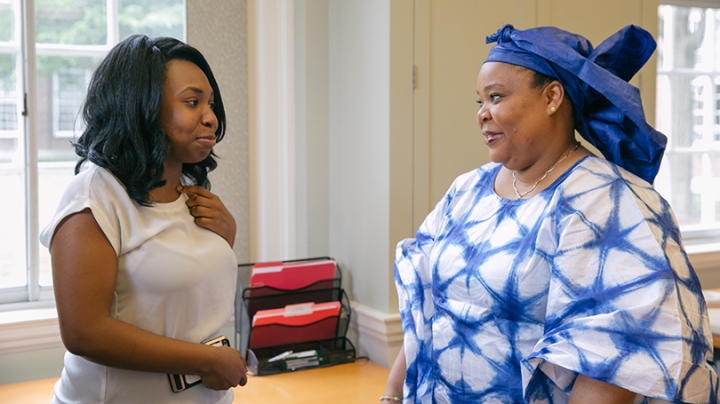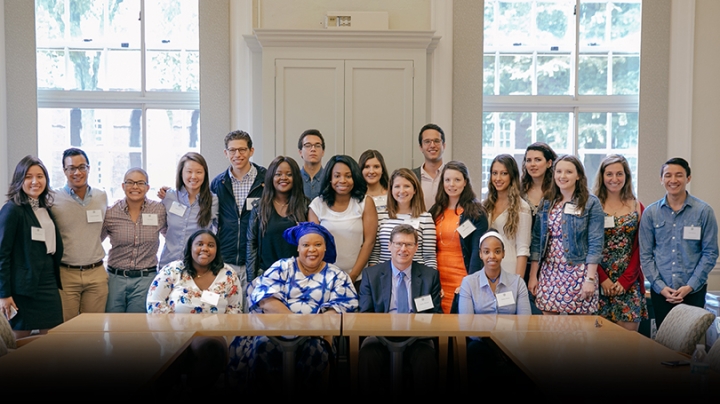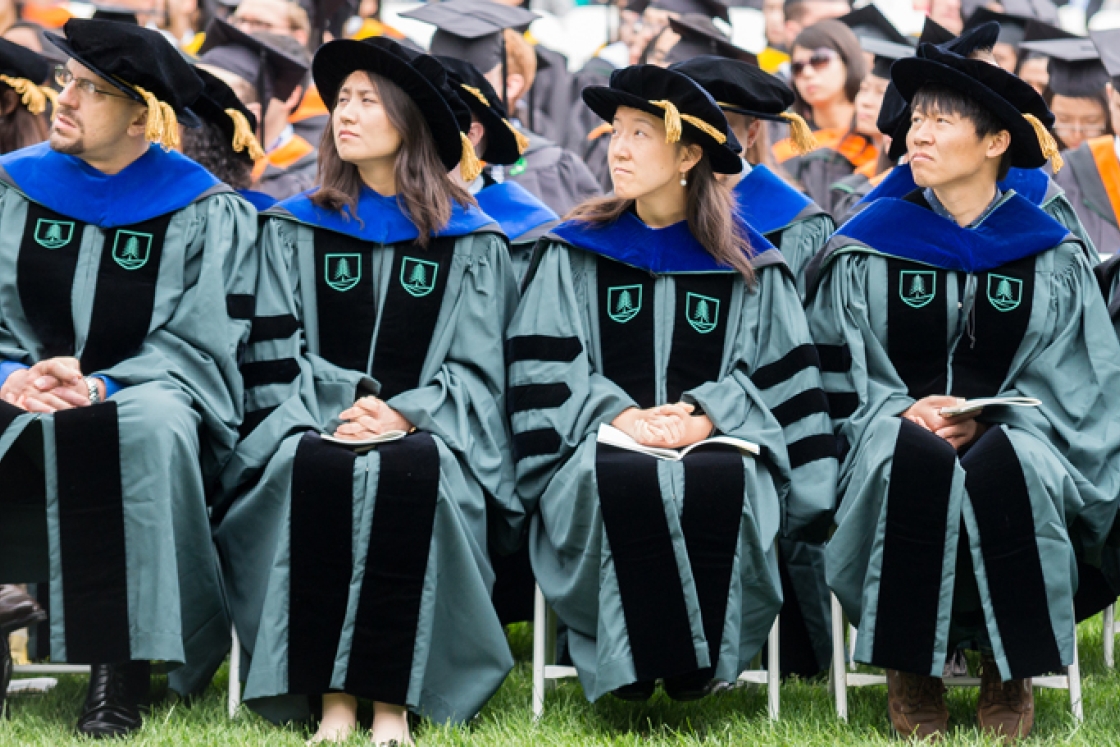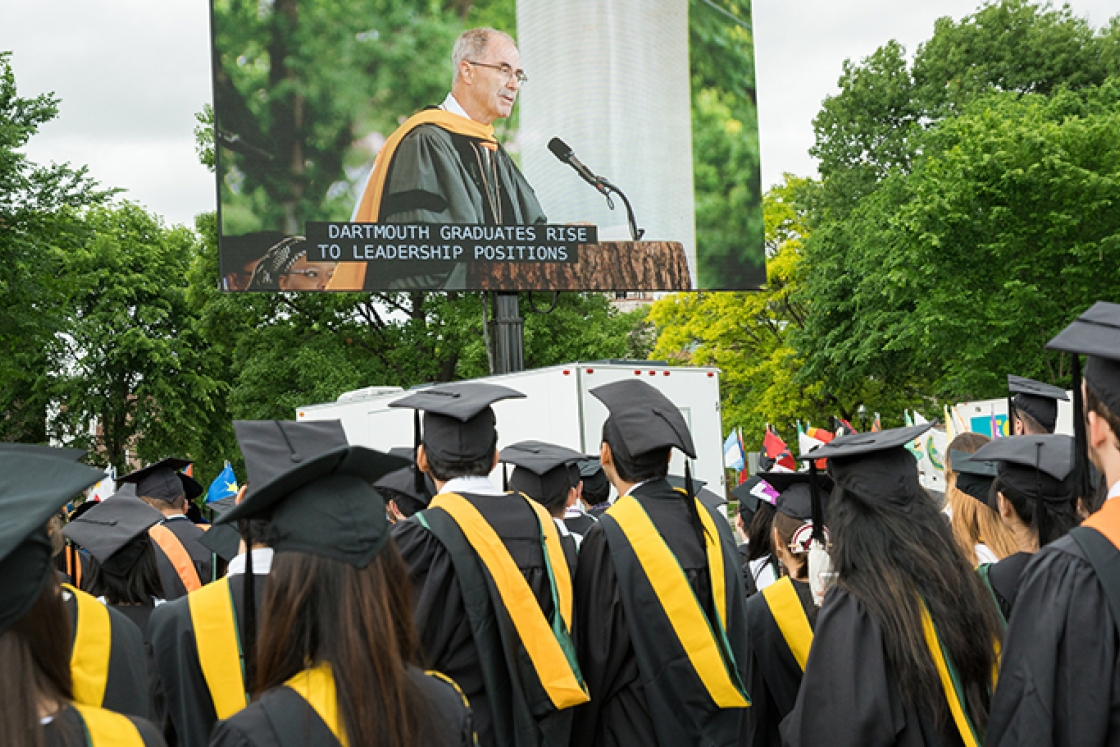A life of activism is “lonely and miserable,” Liberian human rights activist Leymah Gbowee told 20 graduating seniors who joined her for lunch on Saturday in the conference room of the Dartmouth Center for the Advancement of Learning. “Don’t think you’re going to be friends with a lot of people.”
But if you stand by your truth and fight for what you believe in, the Nobel Peace Prize winner told the students, “it’s a very rewarding field.”
In the early 2000s, Gbowee, who will deliver this year’s commencement address and receive an honorary degree on Sunday, helped organize an interfaith group of women who helped to end the civil war in Liberia. Gbowee continues to be a passionate and effective advocate for peace and for human rights around the world—particularly for young women and girls.
Asked what led her to become an activist, Gbowee said, “A lot of anger, actually.”
“I grew up in a very close-knit community, and I was taught that they would protect the children.” She described her community as one that had no ethnic or religious divisions. But when she was 17, the civil war began. “And that same community tore apart.”
“That was what really led me to my path,” she said.
Wanting to make a difference, she chose to “use my voice, and use my body, and use my pen to confront” the injustices she saw around her.
Saying she could relate to that anger and also for “that love for the world” that motivates activism, Leehi Yona ’16, an environmental studies and biology double major who as a senior fellow this year wrote a guidebook for young climate change activists, wanted to know what keeps Gbowee going in her fight for the causes she believes in, even when she can’t always see the impact of her work.
“I will say to you, I have a strong faith in God,” said Gbowee. “When you do the work of activism, you cannot focus on negativity. So you have to wake up every morning in the midst of all of the trash of evil, and find that one thing that gives you hope.”
She told the story of a meeting with United Nations representatives in the Democratic Republic of Congo, at which she was furious about how little was being done during the war to protect civilians from rape and other human rights abuses. But that same day, she learned that a Liberian women’s rights law, for which she had fought for two years, had finally passed.
The moral?
“The work of an activist is not like a doctor who can come out of the room and say the surgery was successful,” she said. “You may not see the impact of what you’re doing in your lifetime, but you have to encourage yourself. So it’s a pessimistic field, but you have to fill yourself with a lot of optimism. Every day you will see things that will make you angry. That’s the feeling you need to keep going. But also see things that give you hope because that is the encouragement that you need in the midst of your anger.”
Halimo Hassen ’16 asked Gbowee for her definition of success. The answer, Gbowee said, is in the number of people that you are able to support—not just financially but emotionally and as a mentor. “My most joyous moments in life are when I’ve helped someone achieve their goal.”
“I’m privileged, but I’m also blessed,” Gbowee said. “My privilege is useless if I haven’t used it as a blessing to the world. Am I making any sense to you? You’re privileged to be at Dartmouth. But you can’t just leave feeling privileged. Thirty years from now, you may still be feeling privileged, but you may be a miserable privileged person. So how do I translate privilege into blessing? That can only happen if you use your privilege as a means of doing something that will be for the greater good of others.”
Hassen, an anthropology and sociology double major from Atlanta, Ga., says her parents, who came to the U.S. from Somalia, are “so excited to hear (Gbowee's) commencement speech. Just hearing from a speaker who doesn’t usually have this type of voice during commencement is unique, and I’m looking forward to it.”
Elijah Turner ’16 wanted to know what strategies Gbowee uses to help people in international organizations like the United Nations understand the experiences of people who are being oppressed.
“I never go with a speech that is written theoretically. I take a story with me, a story from the community, a story that they may never hear,” Gbowee said. To get those stories, she said, you have to commit to being on the ground in the communities of the people you want to serve.
“It will help inform the way you fight for justice for the people,” she said. “With your fancy degree, don’t think, ‘I should not be in this place,’ because it is that place that will shape the changing of the world that you hope to change.”
Find the issue that keeps you up at night, Gbowee said. “Whether it is sexual violence, government corruption, whatever it is, first you have to identify why it is that I want to be an activist, what am I going to be fighting for? And then: Who are going to be my allies? The work is never done with multitudes. Some people would think, ‘Oh my God, when Madame Gbowee started there were 10,000 women.’ No. We started with seven.”
Shanet Hinds ’16, who majored in government and has been involved in activism on campus, said meeting Gbowee was inspiring.
“It was amazing to hear someone who has spoken and pushed against the grain of society in so many ways to promote change—and who has had an impact. That has inspired me to know that the work that I’m doing and the work that I hope to do will mean something. It’s not necessarily just about change that I can see, but the change that will happen in the future, even when I’m not here.”



